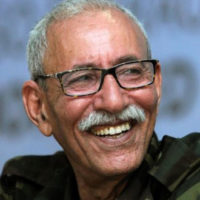Brahim Ghali, President of Western Sahara*

Ghali was born in Smara, Western Sahara on 16 September 1949 (although other sources claimed he was born in Bu Craa, Spanish Sahara). Gali joined the Spanish-led Nomadic troops in the late 1960s, and was subsequently dispatched to Smara for administrative work. After several meetings with Mohamed Bassiri and other Sahrawi political leadership, they decided to create the AOLS in 1969, with Gali being the affiliation secretary of the organization. He participated in the AOLS demonstration held in El Aaiun on June 16, 1970, which passed to be known as the Zemla Intifada. Detained that same night by Spanish soldiers, he was sentenced to one year in prison for his political activities. He was freed in 1971, but was briefly detained again in 1972 for taking part in demonstrations.
Ghali was one of the original founders and leaders of the Polisario Front in 1973, and was elected as the first General Secretary of the movement at its constitutive congress. Alongside El Uali Mustapha Sayed, Gali led the El-Khanga raid, the first military action of the POLISARIO against a desert post of the Spanish Army, overrunning the position and gathering weapons and equipment. In 1974, as El Uali was elected as the new POLISARIO General Secretary, Gali was selected to command the Sahrawi People’s Liberation Army, its military wing.
On October 22, 1975, Gali, El Uali and Mahfoud Ali Beiba met General Federico Gómez de Salazar, the Spanish governor of the territory on the first official encounter between representatives of the Spanish government and the POLISARIO. Negotiations broke off shortly thereafter, with Gali do not attending another meeting with Gómez de Salazar on October 29, while the Spanish government declared a curfew on El Aaiun.
On 4 March 1976, he was designated as the Defense Minister of the first government of SADR, proclaimed in Bir Lehlou on February 27. He remained in that post until 1989 when he was chosen as Commander-in-chief of the Second Military Region.
At an election held on July 9, 2016 in the Sahrawi refugee camps in Tindouf, Ghali was chosen as the next President and Secretary-General of SADR. Ghali replaced longtime leader Mohamed Abdelaziz, who died on May 31, 2016.
Source: https://en.wikipedia.org/wiki/Brahim_Ghali
* Legal status of territory and issue of sovereignty unresolved; territory contested by Morocco and Polisario Front (Popular Front for the Liberation of the Saguia el Hamra and Rio de Oro), which in February 1976 formally proclaimed a government-in-exile of the Sahrawi Arab Democratic Republic (SADR), near Tindouf, Algeria, led by President Mohamed ABDELAZIZ; territory partitioned between Morocco and Mauritania in April 1976 when Spain withdrew, with Morocco acquiring northern two-thirds; Mauritania, under pressure from Polisario guerrillas, abandoned all claims to its portion in August 1979; Morocco moved to occupy that sector shortly thereafter and has since asserted administrative control; the Polisario’s government-in-exile was seated as an Organization of African Unity (OAU) member in 1984; Morocco between 1980 and 1987 built a fortified sand berm delineating the roughly 80 percent of Western Sahara west of the barrier that currently is controlled by Morocco; guerrilla activities continued sporadically until a UN-monitored cease-fire was implemented on 6 September 1991 (Security Council Resolution 690) by the United Nations Mission for the Referendum in Western Sahara (MINURSO)

